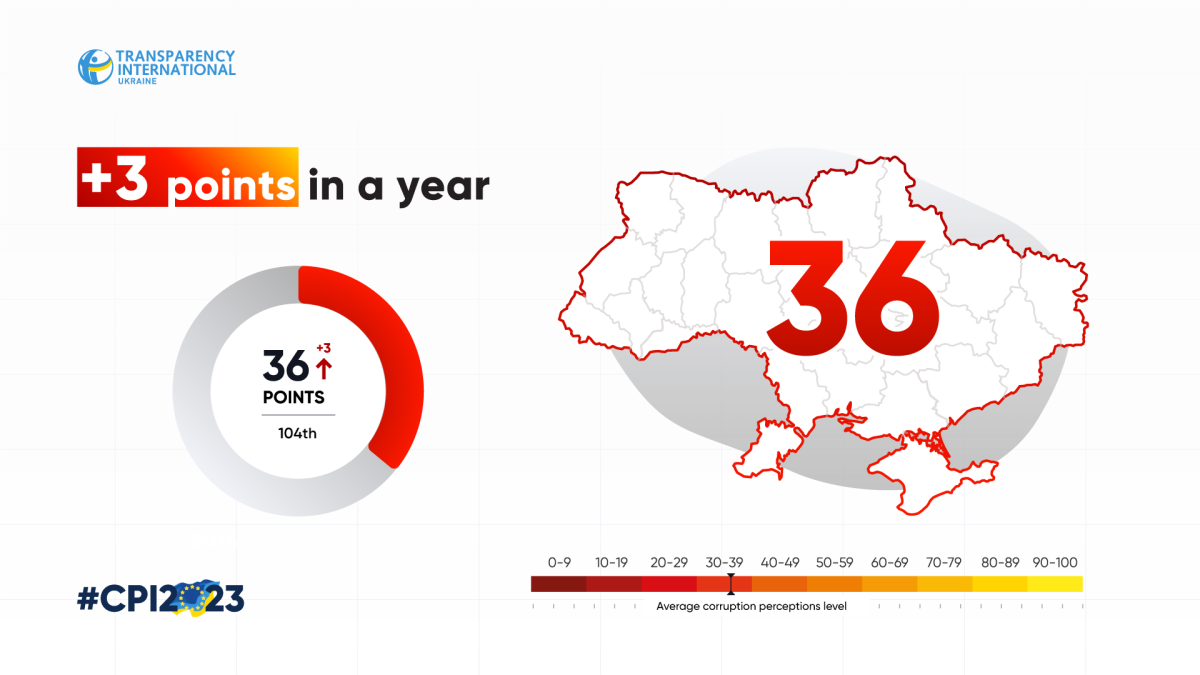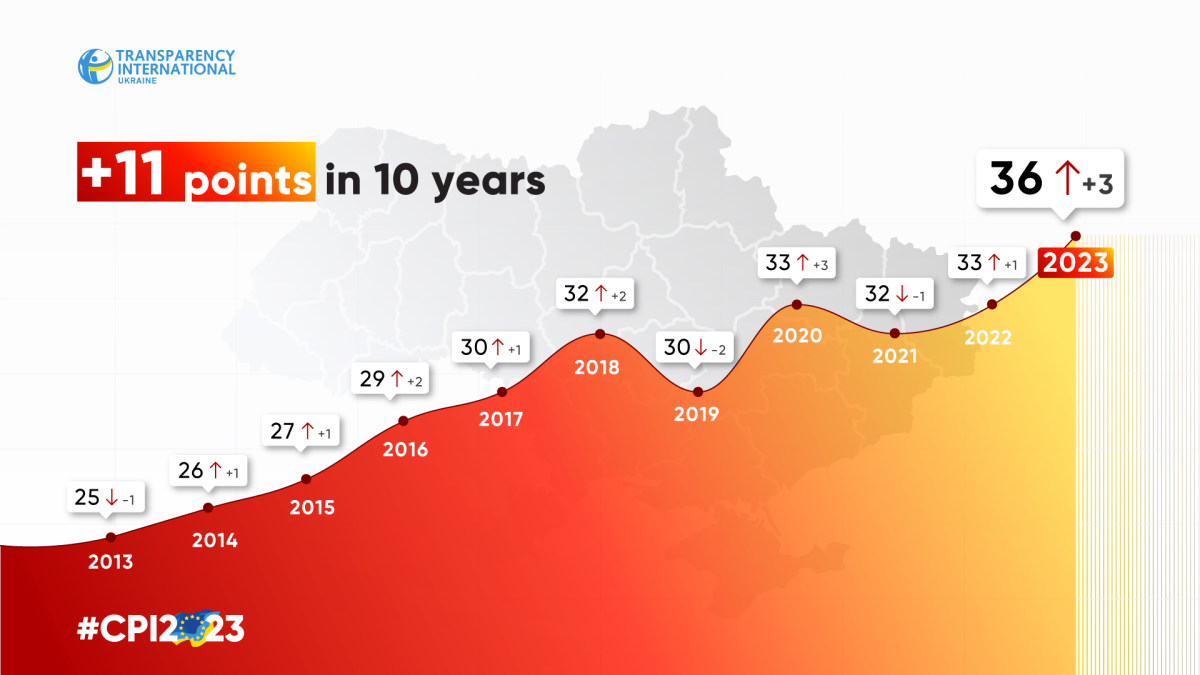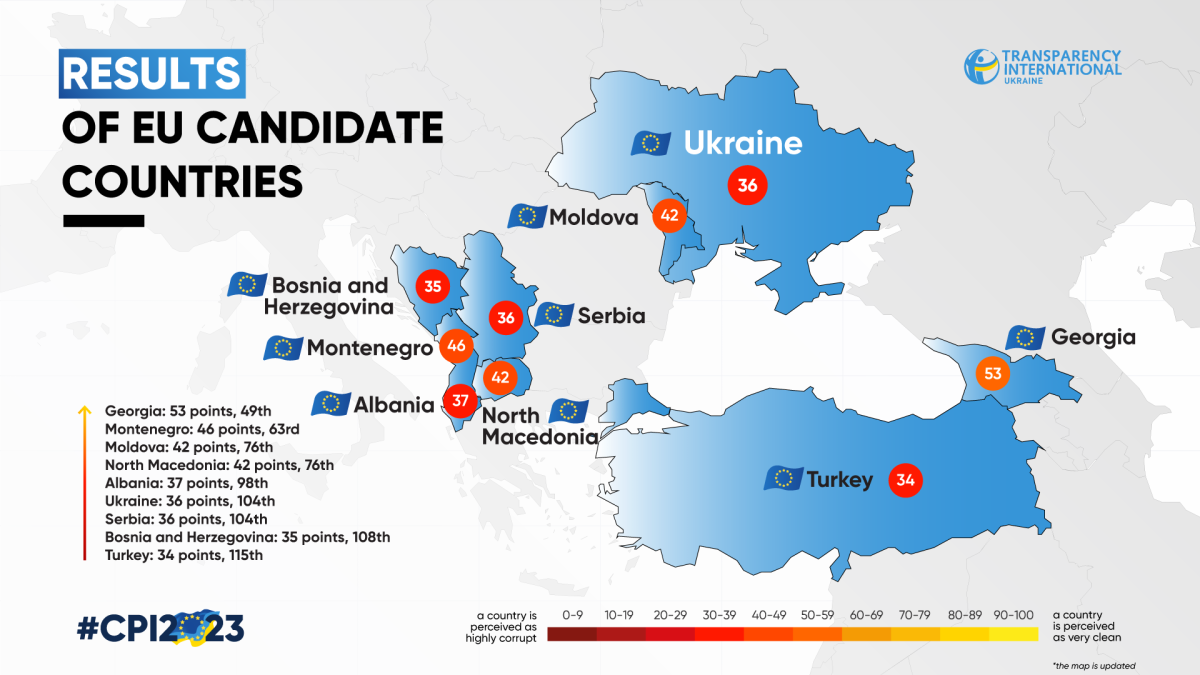According to the results of last year, Ukraine scored 3 points in the Corruption Perceptions Index (CPI). Now with 36 points, we share the 104th position with Algeria, Brazil, and Serbia.
According to these indicators, Ukraine has already caught up with the EU candidate countries, although, of course, we are still far from the EU member countries. Many people may be inspired by this result. Some will be offended, and a lot of Ukrainians will be outraged. How come: so many terrible things happened last year, and we have three points? However, the CPI is a comprehensive assessment of the changes that have taken place and the sustainability of these processes. The trend that we see in this year’s study, despite all the reservations, can be called encouraging.
Let me try to explain why it is so, and where these three points came from.
The CPI is a comprehensive assessment of the changes that have taken place and the sustainability of these processes. The trend that we see in this year's study, despite all the reservations, can be called encouraging.
Andrii Borovyk
Ukraine in the CPI: what is behind this growth?
Imagine a picture of a car driving along a newly paved road. But both the path and the vehicle are very unusual. The car is being repaired right before your eyes: someone is installing the wheel, someone is adding spare parts, and another person is clearing the exhaust pipe while driving, or even installing the fifth wheel, which undoubtedly only prevents one from driving. The road is also unusual because it is being paved right in front of the car’s wheels. A large truck in poor condition is constantly catching up with it, hitting it in the bumper, then on the sides of the car, then trying to pull the car back.
But the car is gaining speed, and everyone—road workers, engineers, and drivers—also needs to speed up their work.
This is how one can describe the current movement of our country. However, a crucial thing in this image is not so much the absurdity of the car or the road as the fact that we know where it leads. This serves as an incentive for further improvement of the car and the road surface.
In fact, this is what our country has been doing in the past two years. The 2023 CPI recorded that while paving this road, we have really done a lot; this is also confirmed by the results of the report of the European Commission.
If we look back on the past year, we will see many positive changes, apart from corruption scandals and the suspicion notices served to senior officials. The adoption of the State Anti-Corruption Program, the resumption of e-declaration and political parties reporting, the strengthening of the SAPO, and the decision to increase the staff of the NABU and the HACC—all this surely indicates the real anti-corruption shifts in Ukraine. The very scandals stirring up society and all the suspicion notices served and sentences passed (there were 65 of them last year) indicate the engagement of civil society, investigative journalists, and law enforcement agencies, which are to fight corruption.
However, it can be difficult to admit that such efforts have actually been made because Ukrainians are demanding and emotional people, especially in November and December. This is our human nature. All our revolutions began in November; we perceive all the negative developments more sensitively at the end of autumn, and this is also the time of great discouragement. Let alone in times of war.
Accepting a noticeable increase in a large-scale international study in January is another challenge. +3 points? How could that happen? We have corruption scandals here every week!
Yes, there is a lot here about Ukrainians’ perception of what is happening in the country. For example, a man stealing USD 100 mln on procurement in 2020 was perceived quite differently in terms of the level of negativity, compared to 2023. Because if in 2020 this act was called “to make money of something,” it was perceived less negatively. But today, the price of corruption is the loss of the defense capability of the whole country.
The perception of this increase of 3 points as “excessive” could be influenced by overestimated expectations of the past year. This, by the way, is shown by two waves of sociological research conducted by TI Ukraine: the first measured the mood of Ukrainians in March, and the second in November.
In spring, all respondents hoped for noticeable progress in various areas, including anti-corruption and reconstruction, whereas in autumn, such elevation decreased significantly. It might seem that we have missed the opportunity, but this is not the case. By no means.
The perception of this increase of 3 points as “excessive” could be influenced by overestimated expectations of the past year.
Andrii Borovyk
When you know the endpoint, even the most difficult path becomes surmountable
All previous attempts of Ukraine to conduct real reform have always resulted in the authorities’ resistance to take steps they found unpleasant. However, in summer 2022, the motivation of the Ukrainian authorities changed significantly because Ukraine became a candidate for accession to the European Union.
We have been talking about the prospect of EU membership for a long time, after the Revolution of Dignity. However, for us and for Europeans, it seemed like a probability of the distant future, and many even considered it to be improbable.
Therefore, although real changes took place in 2014–15, our international partners still had no confidence that they would be long-term. That result reflected the accumulated resentment towards corruption—in particular, in the issue of inhibiting the launch of the HACC and outright stagnation (or sabotage?) in the work of the NACP.
The results of last year, on the contrary, indicate something entirely different. Back in 2022, during brutal shelling and prolonged blackouts, the country showed that its desire to become part of Europe was not just empty words. When the competition to select the NABU director resumed in the winter of 2023, everyone understood the need to ensure uninterrupted power supply and conduct interviews in sheltered premises. But the need to select a new head of an important anti-corruption institution was as crucial, and the competition did take place.
Other significant tasks for the functioning of the state in wartime included the adoption of the Anti-Corruption Strategy by Verkhovna Rada in summer 2022, which it “couldn’t do” in the previous 3 years. The government, although not immediately, approved the State Anti-Corruption Program.
When the EU voted in favor of our candidacy, this wheel of change started gaining momentum.
Thus, looking back on the past year, we can recall many high-profile corruption scandals. During the first year of the full-scale war, we almost heard nothing of them, but then “eggs at the price of UAH 17” and other unpleasant things happened. Some of these unfortunate moments influenced our result in CPI, and some did not. This would have affected the general attitude of partners towards us had there been no relevant political decisions in this area. But such decisions were adopted, and they are also noticed.
Thus, looking back on the past year, we can recall many high-profile corruption scandals. Some of these unfortunate moments influenced our result in CPI, and some did not. This would have affected the general attitude of partners towards us had there been no relevant political decisions in this area. But such decisions were adopted, and they are also noticed.
Andrii Borovyk
The “curse” of an EU candidate
When I told European politicians about the need to negotiate with Ukraine on joining the EU, they repeatedly hinted that after receiving the candidacy and starting negotiations, Ukraine would stop. This is not mockery or disbelief; this is the experience of other countries. After the approval of the new status, they went into the suspended animation mode for two or three years and stopped their movement in reforms.
Let me remind you that currently, another 8 countries are also applying for accession to the EU, and 6 of them have been preparing for this accession for a long time. However, they stumbled upon a kind of “glass ceiling” that prevents them from continuing to develop in accordance with the requirements of the European Union.
And if we consider progress in the Corruption Perceptions Index, we will see that those countries that have long been candidates for the EU have grown very slowly in the CPI. Whereas Ukraine and Moldova, which have shown their desire to join the European community, have demonstrated almost the greatest increase in recent years among all countries. Now Ukraine has caught up with Serbia in the Index and has already overtaken Bosnia and Turkey, while Moldova has caught up with Hungary, which has long been in the EU.
The only new candidate country that demonstrated negative dynamics was Georgia; although its indicator in the CPI is still ahead of other countries, the autocratic steps of the Georgian authorities contributed to slowing down and even stalling its progress in moving towards the West. Because of this, Georgia was granted candidacy later than us.
But I am sure that this will not be the case with us, of which I convinced the Europeans. None of the countries that joined the EU in the past 30 years were in a state of open war. Neither were they geopolitically divided for a long time of their independence, trying to decide where they belonged—in the east, in the center, or in the west.
We went through it all, and now, we see a radical change. Although the very desire to approach Europe led to two revolutions, and the European vector noticeably prevailed even before February 24, there was no support for this course as fundamental as today. It is crucial that this support has been based on the rejection of everything related to Russia and the Soviet Union.
With such a demand from society, the Ukrainian authorities have no other option but to continue reforms. It is unlikely to be fast, and much will depend on the essence of the negotiating framework with the European Union. After all, negotiations are about two parties, and since the EU is primarily an economic union, our politicians need to very firmly defend their interests.
Interestingly, there is currently a lot of dissatisfaction among our politicians with the decisions they make. We have seen this very clearly in the past six months and will see it again in the future. But these changes are demanded by foreign partners and citizens, so everyone who wants to “find a special way” still eventually accepts them. This is the most important thing.
But there are also many people in power who understand the need for high-quality pro-European reform and will support it. And society, including its active part, will remind the authorities of such a demand.
With such a demand from society, the Ukrainian authorities have no other option but to continue reforms.
Andrii Borovyk
What might slow down our progress next year
Despite indisputable anti-corruption and European integration achievements, we may encounter obstacles in the near future that will significantly reduce the speed of our progress.
First of all, the main risk we have been subjected to for almost two years is the full-scale war. It remains an enormous challenge, both for society and for the authorities; it affects everything.
That is why the authorities need to continue to ensure democracy and the rule of law in the country. We have come to understand that, during the war, transparency and honest communication are crucial. Stories of pressure on journalists and civil society activists and attempts to influence business or concentrate power in the hands of one political force only undermine the unity of Ukrainians and are destructive to the entire state system.
Another important, albeit perhaps unobvious, risk is a change in global sentiment. This year, there will be more than 50 different elections in the world, which may change a lot of things in different countries. If, due to the internal populism and challenges at the national level, our partners turn away from us, this will have a negative impact on everything because without the support and assistance of partners, Ukraine will not survive.
These three reasons are not entirely related to anti-corruption. But now all aspects of our lives are so intertwined that such global stories can be much more essential than any isolated changes.
***
Over the past two years, the situation in the country has not become simpler or easier. Yes, we have some achievements. However, we are now in a state of uncertainty in so many directions and sectors. We know for sure that there is a lot of work to be done.
We need to unite and keep ourselves in good shape, join the defense forces, volunteer, serve, and support the country as much as we can to finally become part of the European Community and win the war.









